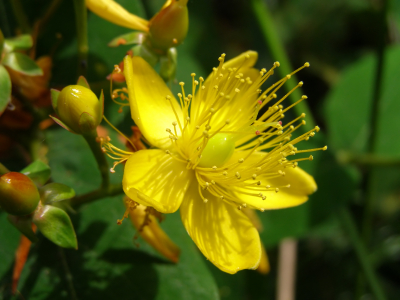St John’s Wort works as well as drugs – with far fewer side-effects
by Yvonne England Dip Raw MBANT
ANH Practitioner Liaison
A recent Cochrane review of 29 trials (5489 patients) concludes that the St John’s Wort extracts tested "a) are superior to placebo in patients with major depression; b) are similarly effective as standard antidepressants; c) and have fewer side effects than standard antidepressants". The review was published in the highly respected Cochrane Database of Systematic Reviews 2008. The studies, which came from various countries, tested various hypericum extracts and mostly included patients suffering from mild to moderately severe symptoms.
The trials compared treatment with the extracts for four to twelve weeks with placebo (18 comparisons), or synthetic standard antidepressants (17 comparisons). Trials were included 1. If they were randomised and double blind, 2. If they included patients with major depression, 3. If they compared extracts with placebo or standard antidepressants, and 4. If they included clinical outcomes assessing depressive symptoms.
Background / history of use
There are 370 species of this aromatic, perennial herb of the genus Hypericum (Hypericaceae family). The herb has golden-yellow flowers and tends to grow in the dry ground of roadsides, meadows, woods and hedges. It is native to Europe, but now found throughout the US and parts of Canada. Hypericum is derived from the Greek words "hyper" and "eikon", meaning "over an apparition", alluding to the plant's ancient use to ward off evil spirits. The dried herb consists of the plant's overground parts (leaves and flowering tops).
It has been used as an herbal remedy since the Middle Ages, and was known to such ancient authorities on healing plants as Hippocrates, Dioscorides and Pliny. It was noted for its anti-inflammatory, diuretic and wound healing properties, and was also used for the treatment of neuralgic conditions such as back pain. An olive oil extract was taken internally to treat anxiety, and applied topically to relieve inflammation and promote healing. The herb later fell into disuse, but then, through its use in Europe as a tea, it regained a reputation as an effective nerve tonic.
It is now widely used for treating patients with depressive syndrome, and is also used for its anti-viral, anti-bacterial, anti-inflammatory and other properties. Since 1995, it has become the most prescribed antidepressant in Germany, where it is a licensed herbal medicine, and is considered safe and effective for the treatment of children.
Studies / active ingredients
The herb has been studied extensively, particularly in Germany. Initially, the focus was on hypericin as the active constituent responsible for the herb’s anti-depressant effects. Most of the studies were done using leaf, standardised to 0.3% hypericin. Many of these showed that for mild to moderate depression, St John’s Wort was an effective treatment.
Controversy was caused when, in January 2001, the Journal of the American Medical Association (JAMA) published results of a large study, which compared St John’s Wort to a placebo (only) for the treatment of major depression. This concluded that St John’s Wort was not effective for the treatment of major depression. Interestingly, this study was funded by Pfizer, the pharmaceutical manufacturer of Zoloft, a leading synthetic antidepressant medication.
Not only was the study said to be flawed because there was no active pharmaceutical drug used to compare with the herb and placebo, but also because the dose of St John’s Wort was said to be insufficient. At about the same time, the Physician’s Desk Reference (PDR – New Jersey) for Herbal Medicines, stated that hyperforin and not hypericin may be the primary active ingredient for treating depression.
Researchers at the department of Pharmacology, University of Frankfurt, extensively studied hyperforin, a major active constituent of St John’s Wort, and stated in their abstract published in Neuropsychopharmacology in the year 2000, that "no other antidepressant compound exhibits a similar broad uptake inhibiting profile".
A Wien Med Wochenschr review in 2007 stated that "constituents that have stimulated the most interest include the naphthodianthrones hypericin and pseudohypericin, a broad range of flavonoids, and the phloroglucinols hyperforin and adhyperforin. According to the actual state of scientific knowledge the total extract has to be considered as the active substance. Although there are some open questions, the bulk of data suggests that several groups of active compounds are contributing to the antidepressant efficacy of the plant extract".
Standardised extract vs. whole herb
In view of the above conclusion, it seems odd that a particular constituent of the herb (usually hypericin) should be isolated using solvents, and then added back in to the processed mix as a standardised extract, thus emphasising the importance of only that particular constituent. Through the use of standardised extracts, are not important constituents often overlooked or underestimated?
Use of the whole herb (one of the fundamental practices in traditional forms of herbalism) appears in many cases to enable synergistic actions of the many biochemical components, thus increasing efficacy. For example the antidepressant effects of hypericin and pseudohypericin were found to increase significantly by adding in the procyanidin constituent, since this enhanced their solubility. Use of the whole herb also appears to enable ‘buffering’, which is believed to reduce adverse effects, and the risk of interactions.
Once an individual herbal constituent is artificially processed and isolated (using toxic solvents), could it not be thought of as a ‘phytopharmaceutical’ drug? This is believed to be one of the reasons why studies using standardised extracts of St John’s Wort have revealed complex interactions. It is even suggested in this abstract that a synthetic derivative of hyperforin is manufactured, which may indeed result in some interesting side effects!
The traditional medical herbalist, Bendle MNIMH, Dip Phyt has some thought provoking comments on standardisation and side effects.
Effect on the liver / interactions / adverse effects
Many of us know that bitter green leafy vegetables (such as rocket) are good for the liver. Many ‘green leafy’ herbs have also been shown to be ‘good for the liver’, with their various normalising, or detoxifying effects. When such effects are very pronounced, as is the effect of St John’s Wort on the cytochrome P450 enzyme within the liver, and the speeding up of phase 1 detoxification, it is to be expected that pharmaceutical drugs, if taken alongside, will be reduced in toxicity. It is logical that toxic substances and detoxifying substances may influence each other. Unsurprisingly, this has got St John’s Wort into trouble. Not only does it compete very favourably with antidepressant pharmaceutical drugs, but it also has the cheek to attempt detoxification of pharmaceutical drugs within the liver, thus rendering them less effective!
Some health authorities, doctors and pharmaceutical industry reps have argued that because St John’s Wort seems to raise brain seratonin levels, there is a risk that if a tricyclic antidepressant is being taken at the same time, excessive seratonin levels might develop in the brain. Serotonin syndrome, which may potentially have fatal consequences, is well known as a risk associated with excessive use of SSRI drugs like Prozac.
However, given that St John's Wort seems to be associated with, at most, marginal increases in serotonin (see article by well-known US integrative medicine practitioner, Dr Hyla Cass) it seems, in practice, that there is no real risk of serotonin syndrome when St John's Wort is used. Additionally, since St John's Wort is indicated for mild to moderate depression, it would tend not to be used in conjunction with SSRI drugs.
Caution should be exercised when taking any drug whilst taking St John’s Wort. Sometimes more of a drug is given to compensate for the detoxifying effect of the herb, but this can be dangerous, particularly if the herb is then discontinued for any reason. The herb should also be avoided during pregnancy and lactation. (It should also be noted that other types of herb may have the effect of increasing the effect of a drug in the body, rather than decreasing it.)
Adverse effects are mimimal, and have been found comparable to placebo. A review in 2004 (594 patients) which compared adverse events during clinical trials with the herb to those observed under placebo and synthetic antidepressants, found no specific effects of Hypericum extract.
Too effective for its own good
St John's Wort became very popular in Ireland as a means of helping people through low mood / depression. People were opting for the herb in droves, buying it from health stores in favour of SSRI prescription drugs. In 1999, as many as 75,000 Irish people used St John’s Wort.
But since depression is regarded as a disease, the Irish Medicines Board (IMB) decided to act against the herb. On 1st January 2000, the Irish health minister, based on advice from the pro-Pharma IMB, deemed St John's Wort a prescription drug, banning it for over-the-counter sales. Since most suppliers do not have the resources to file for a drugs licence, the availability of St John's Wort to the general public was curtailed dramatically—overnight.
Is St John's Wort simply too effective for its own good? Whatever will the regulators try next? It will be interesting to see what the European Food Safety Authority does with it in its evaluation of herbs used in supplements. Will we see more and more EU Member States following the Irish government's precedent?
References
Linde K, Berner MM, Kriston L. St John's wort for major depression. Cochrane Database of Systematic Reviews 2008, Issue 4. Art. No.: CD000448. DOI: 10.1002/14651858.CD000448.pub3
Shelton RC, et al. Effectiveness of St. John's Wort in major depression: a randomized controlled trial. JAMA 2001 Apr 18;285(15):1978-86
Wonnemann M, Singer A, Muller WE. Inhibition of Synaptosomal Uptake of H-L-glutamate and H-GABA by Hyperforin, a Major Constituent of St John’s Wort: The Role of Amiloride Sensitive Sodium Conductive Pathways. Neuropsychopharmacology 2000, 23 188-197.10.1038/sj.npp.1395510
Butterweck V, Schmidt M. St John’s wort: role of active compounds for its mechanism of action and efficacy. Wien Med Wochenschr 2007;157(13-14):356-61
Butterweck et al. Solubilized hypericin and pseudohypericin perforatum exert antidepressant activity in the forced swimming test. Planta Med 64(4):291-4. May 1998
Trautmann-Sponsel RD, Dienel A. Safety of Hypericum extract in mildly to moderately depressed outpatients: a review based on data from three randomized, placebo-controlled trials. J Affect Disord. 2004 Oct 15;82(2):303-7
Finfgeld DL. Serotonin syndrome and the use of SSRIs. J Psychosoc Nurs Ment Health Serv. 2004 Feb;42(2):16-20








Comments
your voice counts
There are currently no comments on this post.
Your voice counts
We welcome your comments and are very interested in your point of view, but we ask that you keep them relevant to the article, that they be civil and without commercial links. All comments are moderated prior to being published. We reserve the right to edit or not publish comments that we consider abusive or offensive.
There is extra content here from a third party provider. You will be unable to see this content unless you agree to allow Content Cookies. Cookie Preferences